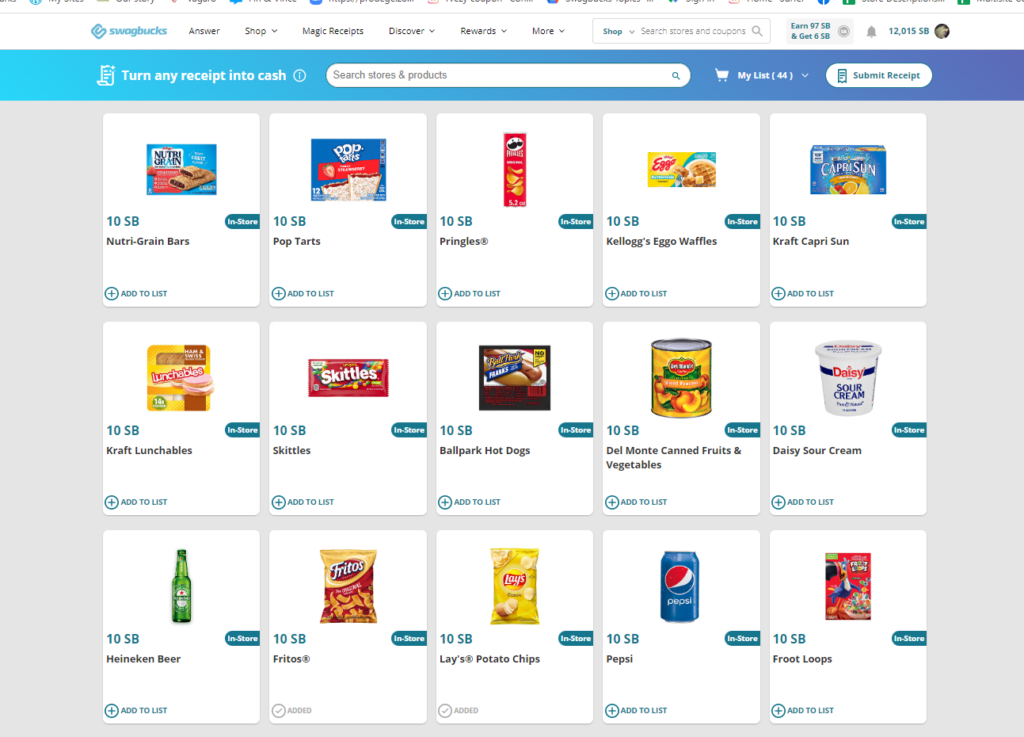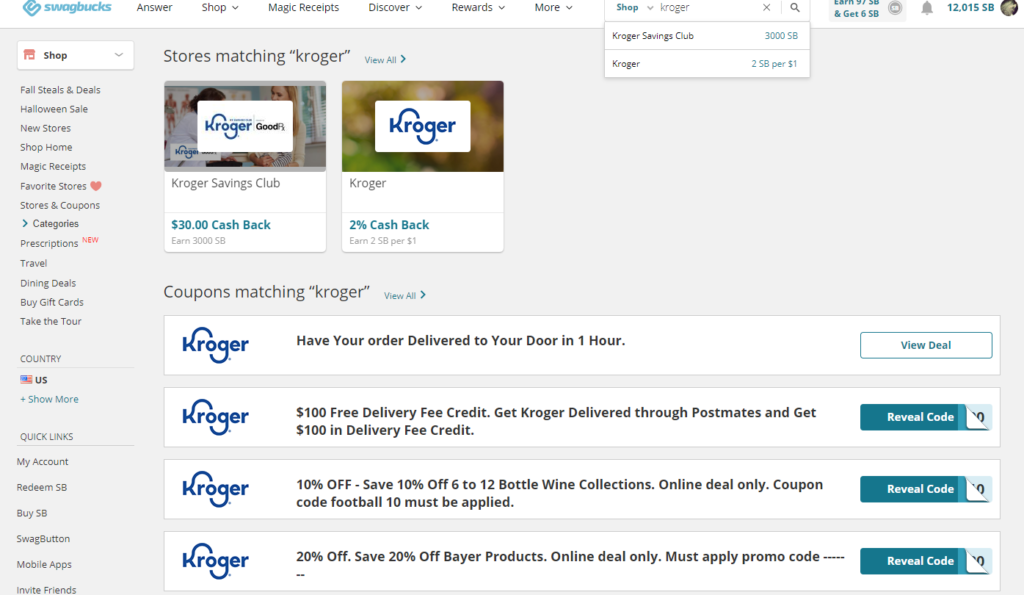The cost of food is soaring. A girlfriend was recently quoted $2 per wing for a pre-dinner hors d’oeuvre spread at her wedding. According to the Consumer Price Index, the cost of groceries is up 10.9% year over year. And data from Fortune shows the price of popular food staples is up 24% from January 2020.

Groceries are taking a big bite out of everyone’s wallet. But it’s not all bad news energy. With online shopping, grocery apps, and price comparison tools at our fingertips, there are plenty of ways to soften the blow and save on your supermarket spending.

In fact, there are a number of clever ways to save money on groceries that you’re probably blowing past on the regular. Browse through this article or read it in whole: either way, you’ll find some easy ways to skim (without skimping) on your grocery costs.
What are 3 strategies for saving money on groceries?
These are 3 effective strategies to save money on grocery shopping.
1. Meal Plan
Plan your meals for a week. Or however long you go between grocery store runs. Meal planning may sound tedious. I’ve sat down to do it with good intentions, only to get distracted and never come up with a plan beyond the evening’s dinner. But mom bloggers and economists agree: meal planning is where it’s at when it comes to shopping for healthy, tasty foods at the best prices.
Figure out what meals you want to eat for the week, and make a list of all the ingredients. I try to include a meat, a starch, and vegetables with each meal. I like to figure out a few meals per week so then we can have leftovers on a couple of nights. (Right now, there’s no pushback on leftovers so I’m going to ride that wave.)
It saves a lot of stress and decision fatigue when you’ve got your meals planned out in advance. You know what’s for dinner each night so you’re not scrambling. And you’re not grabbing what looks good and tossing it in the cart at the store. Planning eliminates food waste not to mention impulse purchases on spendy food.
2. Make a List, Check it Twice
Make a list of what you need, and check it twice. Does a recipe call for fresh dill when you have the dried spice? (You can use the dried herb in higher quantities.) Can you use the sage you have on hand instead of marjoram?
Also, make sure you’re not listing an item that’s hiding somewhere in the back of a cupboard or a pantry. Tip: You can earn cash for creating grocery lists and adding items to the grocery list with the rewards app Swagbucks. You’re already making a grocery list – get paid for it!
3. Compare Prices
Compare prices. You don’t have to compare prices at all grocery stores in your zip code, but there are probably a few local grocery stores that you do frequent.
Compare prices for some of the pricier items and regular staples like meat, eggs, milk, rice, pasta, and produce. Grocery chains make it easy for you to compare prices with their ads – you can check online or look through the circular if you get it in the mail.
I tend to hit up a few grocery stores each week (hitting them all up in a pre-planned 5-mile loop that I consider one grocery trip). I’ll hit up Target, Aldi, and Trader Joe’s. I typically get meats at Aldi’s but I’ll buy produce at any of those three stores depending on who is the cheapest. And I always buy generic brands or store brands – except for frozen veggies.
If you’re on a bus line or you’re not able to easily hit up a few stores, you can plan your grocery list and weekly meals in advance around what’s on sale that week at the store. Most grocery stores will have one meat or fish item that’s especially cheap that week, and that can be your protein of the week. If ground turkey is discounted, lean into it. You can do turkey burgers, turkey meatballs, and turkey chili.
How can I spend the least money on groceries?
Here are some ideas for stretching your grocery budget and spending the least amount of money.
- Meal plan for the week. Meal plan around cheap proteins or main course foods based on what’s for sale.
- Compare prices online at different grocery chains and big box stores. Occasionally, receipt apps like Swagbucks, Tada, or Ibotta will have especially generous deals like $1 cash back for purchasing ground beef or $3 for purchasing two jars of pasta sauce. I have based my meal planning around featured app deals before.
- Use coupons. This doesn’t just mean clipping coupons out of the paper, although you can still do paper coupons if you want to. With many digital coupon apps, there are coupons you can use just by tapping them. You can then give the clerk a barcode to scan on your phone, or you can scan the receipt and you get the coupon savings credited back to you in the form of cash.
- Use store loyalty apps. Target, for example, has a store loyalty app that includes manufacturer coupons, in-store savings on featured items, and the ability to earn free Target gift cards and cash back rewards. Safeway has a gas rewards program. You can purchase featured goods and earn gas back rebates to save at the pump.
- Don’t shop on an empty stomach. When you shop on an empty stomach, you’re more likely to go for impulse purchases and disregard (or rationalize) those food prices.
- Set a food budget and stick to it. I admit I’m not the best at this now, but when I was younger and single, I enjoyed doing this as a game. I set a budget of $75 per week and tried hard to stay under it. I used those leftover funds for other rewards like an ice cream cone at the local creamery or a food cart taco. The trick with a food budget is to motivate yourself to come in under it.
- Visit your local farmers market. While the farmers’ market may have produce that’s more expensive than your local grocery shop, you can find deals too. Shop what’s in season and visit the market near the end of the day. Vendors are often willing to haggle to clear their goods. Or you can buy bruised or misshapen produce for cheap. You’re saving money and saving the earth from food waste!
- Consider joining a warehouse club like Costco or Sam’s Club. These clubs promise tremendous savings for buying in bulk, like a case of dried beans or a lifetime supply of toilet paper. Often, you can find decent prices for crates of fresh produce too. A warehouse club isn’t always the best deal: your local Kroger or Walmart could offer many of the same items at the best price. Even if you can get the cheapest per unit price at a warehouse club, there are other lifestyle considerations. Do you want to lose your hall closet for half a year to save $6.38 on a case of toilet paper and 2 cubic feet of Doritos?
- Visit a salvage grocery store. Salvage grocery stores sell only expired foods or foods near their expiration date. You can often find misshapen produce or boxed goods with packaging dents. Many experts feel that food expiration dates are arbitrary at best and can be quite random. I’ve had milk go bad before its expiration date, and I’ve also eaten sour cream that looked and tasted fine a few months past its expiry date (and it went down fine too). It’s up to your best judgment.
- Shop online. You can skip the store altogether and do your grocery shopping online. Over the past few years, I’ve used Instacart and Shipt a lot to get groceries from a handful of different supermarkets. You can use these grocery services on the website or in the app. There are membership fees (Shipt is $99 a year) and some of the items might be a little bit more in the app than in the store, but it still saves us money. Buying on the website or the app, I order only what we need and avoid impulse buys like processed foods on display and bakery donuts.
- Claim cashback online! Yes, you can earn cash back rebates for your online purchases from supermarkets and pharmacies too. Not all food items are eligible, but many are. Swagbucks offers you exclusive deals and cash back for shopping at Kroger, Albertsons, Sam’s Club, Organic Baby Food, Vons, Rite Aid, CVS, and Walgreens.

How can I save money on food without cooking?
Here are a few ways you can save money on food without cooking – as long as you don’t consider pushing a microwave button a form of cooking.
- Get a rotisserie chicken from Costco for $4.99. Even with inflation, Costco’s chicken price is not going up. Pair the dish with frozen mixed veggies for $1.99 and a baguette loaf of bread for an extra $1.99. For $8.97, that’s a meal for 6 to 8 people. (Those birds are seriously huge. Way bigger than the rotisserie birds sold at other grocery stores.)
- Walmart sells cheap premade meals ready to go into the slow cooker. You can just add water and set the dial. Options include the Tyson beef roast kit for $21.97 or the Tyson pork roast kit for $14.47. Each kit serves 8 people. For beef, that’s $2.75 per person per meal. For the pork kit, that’s $1.81.
- Get a Costco hot pizza to go for $9.95. Their hot fresh baked pizza is a different recipe than the frozen variety. For the occasional easy meal, $9.95 can feed a family of 4.
- Visit restaurants with freebies. Visit a restaurant where kids eat free or adults get freebies. At Olive Garden, you can get a pasta meal starting at $9.95 that comes with unlimited breadsticks or soup and salad. Fill up on the salad and breadsticks and drink water, take the pasta to go. At the average national state tax of 6.57% and a 15% tip, that’s $12.19 to dine out. And with their pasta dishes notoriously huge, you can get 2 to 3 meals out of your pasta dish at home. And it’s a bonus meal you can heat up in the microwave without having to cook!
Bottom Line on Saving Money on Your Grocery Bill
There are a lot of ways to save money on groceries and household items. Planning your meals, comparing prices, and sticking to a shopping list are easy ways to shave 20% to 30% off your bill upfront. And with digital coupons, and cash back apps for supermarkets, you can stretch your grocery dollar further and really save big.
Trending Articles:
- 10 Best Work From Home & Online Jobs to Earn Money in 2022
- Earn Free Crypto
- Make Money by Walking
- Sam’s Club Black Friday Deals 2022
- Can You Make Money on YouTube?
- 23 Easy as pie ways to make money in 2022
- What is Cryptocurrency?
- SurveyMonkey Review and Alternatives
- How to Make 200 a Day
- Surveys for Gift Cards
- How to Get Free PlayStation Gift Cards, PSN Codes & Rewards in 2022
- Alternative Income Streams
